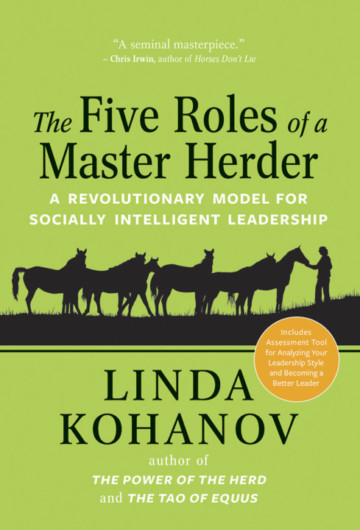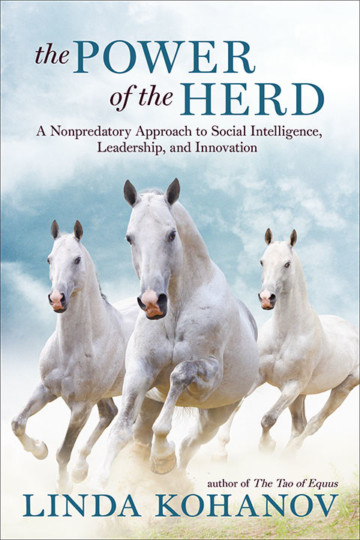 The Five Roles of a Master Herder
The Five Roles of a Master Herder
A Revolutionary Model for Socially Intelligent Leadership
Linda Kohanov
2016 New World Library (Book)
Now available at www.amazon.com
Across several bestselling books, author and teacher Linda Kohanov has explored “the way of the horse,” an experiential wisdom gained by studying the nonpredatory power of horses. In The Five Roles of a Master Herder, she adapts these horse-inspired insights into useful tools for developing collaborative leadership and managing change.
Over thousands of years, Kohanov writes, “master herders” of nomadic herding cultures developed a multifaceted, socially intelligent form of leadership combining the five roles of Dominant, Leader, Sentinel, Nurturer / Companion, and Predator. The fluid interplay of these roles allowed interspecies communities to move across vast landscapes, dealing with predators and changing climates, protecting and nurturing the herd while keeping massive, gregarious, often aggressive animals together — without the benefit of fences and with very little reliance on restraints.
She includes an innovative assessment tool that will help you determine which roles you currently overemphasize and which roles you may be ignoring — or even actively avoiding. Through this powerful, at times surprising and moving book, Kohanov will show you how to recognize, cultivate, and utilize all five roles in the modern tribes of your workplace, family, and other social organizations.
 The Power of the Herd
The Power of the Herd
A Nonpredatory Approach to Social Intelligence, Leadership, and Innovation
Linda Kohanov
2012 New World Library (Book)
Now available at www.amazon.com
Linda Kohanov is beloved for her groundbreaking articulation of “the way of the horse,” an experiential wisdom known to riders for centuries but little studied or adapted to off-horse use. Now Kohanov takes those horse-inspired insights on the nonverbal elements of exceptional communication and leadership into the realms of our workplaces and relationships. Here we explore the benefits of “nonpredatory power” in developing assertiveness, fostering creativity, dealing with conflict, and heightening mindbody awareness.
In “A Brief History of Power,” the first part of this far-reaching book, Kohanov profiles cultural innovators who employed extraordinary nonverbal leadership skills to change history, usually on horseback: Winston Churchill, George Washington, Alexander the Great, and Siddhartha Gautama (the Buddha), among others. She also draws on the behavior of mature horse herds, as well as the herding cultures of Africa and Mongolia, to debunk theories of dominance hierarchies, challenge ingrained notions of “survival of the fittest,” and demonstrate the power of a consensual leadership in which governing roles are fluid.
Kohanov then adapts these lessons into twelve powerful guiding principles we can all incorporate into our work and personal lives. Eloquent and provocative, this is horse sense for everyone who seeks to thrive in the herds we all run in — our communities, careers, families, and friendships.